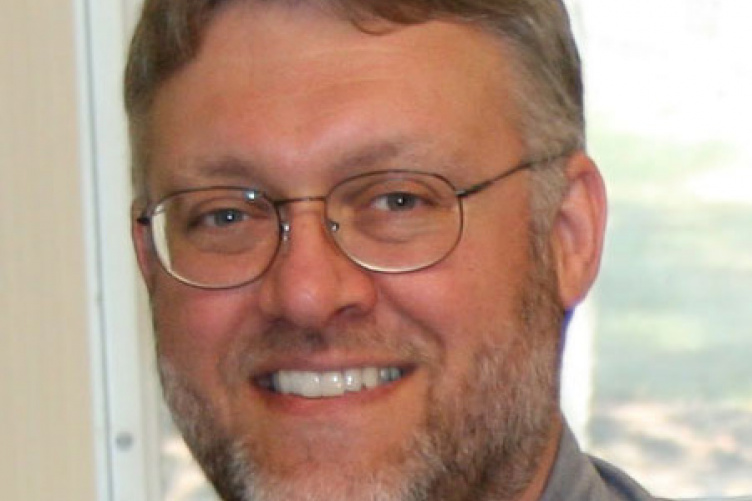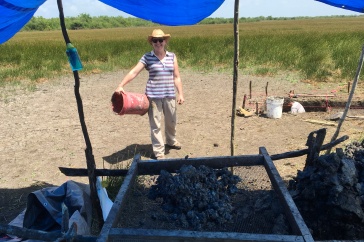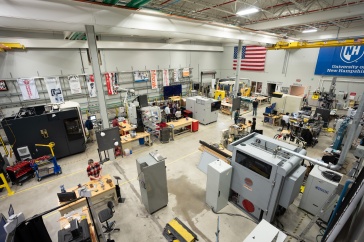
Steve Kossakoski, who earned a master’s degree in education and doctorate in education administration at UNH, founded New Hampshire’s only public online high school, the Virtual Learning Academy Charter School.
New Hampshire public high school students who need remedial education, want accelerated courses, or are looking for more flexibility in their course schedule today can turn to New Hampshire’s only public online high school – Virtual Learning Academy Charter School – which was the brainchild of UNH education alum Steve Kossakoski.
“We feel we can help kids everywhere and we want to push the envelope as far as the future of education. I don’t believe traditional school should or would go away, but we should open all the doors to allow kids to learn in a way that is in their best interest,” says Kossakoski, who earned a master’s degree in education in 1993 and doctorate in education administration in 2000 at UNH.
Kossakoski started Virtual Learning Academy Charter School (VLACS) in May 2007. The idea was borne out of his work in SAU 17, which serves the Sanborn region, where he served as a technology teacher, coach and director of technology. Kossakoski was the assistant superintendent of SAU 16, which serves the Exeter and Stratham area, when he left to became the CEO of the state’s first virtual independent public charter school.
A nonprofit, VLACS is publicly funded like traditional public K-12 schools and is administratively located in Exeter. Any New Hampshire resident under 21 can attend VLACS for free. Most of VLACS students are part-time students who attend a New Hampshire public school. The rest of the students are home-schooled students, private-school students, or students who dropped out of high school.
VLACS enrollment has skyrocketed from 350 students at its inception to more than 10,000 today. It is the eighth largest virtual high school in the nation. VLACS students reside in all of New Hampshire’s 10 counties, and many hail from rural communities such as Etna, a small 800-person village located within the town of Hanover.
“We encourage all students to enroll regardless of their technological capabilities, perceived level of motivation, or organizational skills. In fact, we find that many so-called ‘unmotivated’ students blossom in an online environment where they receive one-on-one attention from instructors,” Kossakoski says.
VLACS offers more than 100 courses for students in sixth through 12th grade, including dual college credit courses and advanced placement (AP) courses. Kossakoski hopes that someday students will be able to earn an associate’s degree while still in high school. Classes are all online, flexible, and self-paced. Classes are course-based and have specific competencies integrated into each one.
Students read traditional high school textbooks and spend a considerable amount of time outside of class working on projects to meet course competencies and having experiences that tie directly to their in-class learning. For example, for a government class, students might volunteer with a political campaign or work in a town office.
Steve Chamberlin, superintendent of the Hopkinton School District and a UNH doctoral student in education, says VLACS allows all schools, but specifically small schools, to personalize learning, from offering courses schools cannot offer or offering courses that provide increased flexibility in a student’s schedule.
“VLACS also offers the opportunity for students to accelerate their learning. This any place, any time educational model is blending educational opportunities with our programmatic offerings. For the right student, one with self-discipline and technological passion, it has been a great asset,” Chamberlin says.
Students work closely with their teachers, who also get to know the parents of their students. Barbara Higgins, a VLACS fitness and health instructor and a member of the Concord School District School Board, says her connections with her VLACS students are closer than she ever was able to have with her in-class students.
“Students are much more open and personal in their responses in a one-to-one setting. As a health educator I find that students are more willing to ask questions because they aren't raising their hand in front of 29 peers, and I am not answering them that way. By the time a student finishes a class, I have come to know them and their family in a way that could never happen in a public school. The avenues for meaningful connections between students and parents that VLACS provides are what make online learning so wonderful,” Higgins says.
Jeff Nawrocki ‘82, president of JSN Associates Inc., says his four children attend VLACS so that they have time to compete as ski racers.
“From a parent perspective, this opens up a lot of options for kids who may wish to pursue nontraditional interests. Our kids move up north for the winters and use VLACS to satisfy their education for the two quarters they are away from their home high school,” says Nawrocki, who skied for UNH as an undergraduate in civil engineering.
“VLACS is not easy. It is very challenging, and kids definitely need self-motivation to keep up with it,” he says.
Students credit VLACS for inspiring personal growth, improved time management skills and independence. Karen Sarosiek of Stratham graduated from VLACS in 2011 as a New Hampshire Scholar, which recognizes students who complete at least three years of college prep or honors classes in math, science and English. She now is a sophomore at UNH studying geophysics and plans to work in the oil industry or ocean biological field after graduation.
“I gained skills in VLACS that some students have to wait until college to learn. I learned presentation skills, phone skills, self-motivation skills, and accountability skills. These most definitely prepared me for my college career,” Sarosiek says. “I also made some of the best friends of my life through VLACS.”
To learn more about VLACS visit www.vlacs.org.
Originally published by:
UNH Today
-
Written By:
Staff writer | Communications and Public Affairs
















































